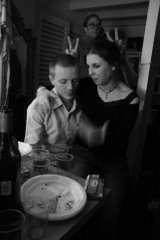In a nutshell: as always with Ken Follett in a nutshell is complicated as this volume, the first in a triolgy spanning the main events of the 20th century, is 850 pages long. Here goes. We start in 1911 in a small Welsh mining town. We meet several characters, Billy, teenage miner and his beautiful sister Ethel who works at the local rich man's house. We meet Fitz, the local rich man, and his Russian homesick wife. All these people and many moreare the center of a huge web of lives that span from the outbreak of the first world war, the Russian revolution and America's intervention in the war.
The blurb: Ken Follett is reproducing exactly the same tricks as with his previous books, Pillars of the Earth (read review here) and World without End (read review here). The idea is that we follow a cast of dozens, who are all more or less related, sometimes in the most improbable ways. The backdrop is a page turning 8-year chronology of the bloody trenches in northern France to the fragile start of the Soviet Union. We follow characters in the States and get a flavour of immigrant New York as America's politicians prepare for war. Miners, soldiers, diplomats, spies, princesses, revolutionnaries, suffragettes, politicians, criminals, everyone is represented and weaves together the history of that time.
Sometimes though the links between the people are bizarre: the sister of the young miner we meet in Wales at the beginning is the mother of the bastard child of Fitz whose wife is a Russian princess who murdered the mother of Grigori who becomes Lenin's close colleague and Lev who goes to New York but lands in Wales in the very same mining town where Maud the sister of the Earl is having an affair with the German spy who... and so on. It actually gets a bit confusing, and there is a lot of blood, battle and fighting in the second part of the book whereas the first was more focused on the characters.
IMHO this started to get a bit long and boring about three quarters in. There are a lot of people and plots and thought it is interesting to see the bigger picture develop, we start to lose track of reality as we swap from Russian revolution to New York underworld to suffragette London and and Westminster war councils. Good for people who like big complex war sagas written in a one big breath.
IMHO this started to get a bit long and boring about three quarters in. There are a lot of people and plots and thought it is interesting to see the bigger picture develop, we start to lose track of reality as we swap from Russian revolution to New York underworld to suffragette London and and Westminster war councils. Good for people who like big complex war sagas written in a one big breath.


